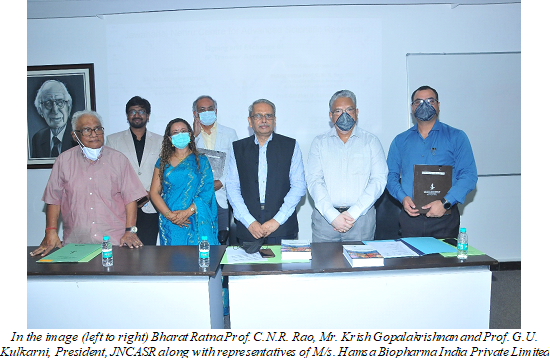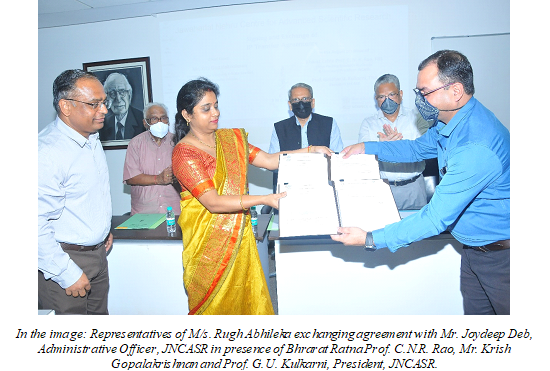IP Transfer Agreements with industries, one on a molecule that could be a potential drug candidate for dementia and the other related to a robust, mobile group oxygen concentrator that can be used in remote settings and deployed in emergencies, would soon bring the two research endeavours to the people.
Jawaharlal Nehru Centre for Advanced Scientific Research (JNCASR), an autonomous institute under the Department of Science and Technology, signed the agreements to transfer the two technologies from its research initiatives to industries.

Bharat Ratna Prof. C N R Rao, while appreciating the research from the laboratories reaching the industries, congratulated the faculty members of JNCASR and conveyed his best wishes for these endeavours. Prof. G.U. Kulkarni, President, JNCASR, also conveyed his congratulations to the faculty members.
Mr. Kris Gopalakrishnan, Director, Axilor Ventures Private Limited & Co-founder Infosys, in his address, indicated that education and research are the only factors that build a strong foundation for the development of the nation and advocated investment by the private sector in research initiatives apart from the government grants to reach a level of 3% GDP spending on R&D activities. He further mentioned that the need for funding is of the order of 15 times the current value by the private sector in order to reach the expected level. The two technologies being transferred to partners for commercialization are exciting ones and augur well for JNCASR and the research ecosystem. He congratulated the entire JNCASR team on this wonderful development.
Technology-1
Professor. T Govindaraju, a Scientist at Jawaharlal Nehru Centre for Advanced Scientific Research (JNCASR), and his team have developed the molecule that could be a potential drug candidate to halt or cure the leading cause of dementia (70-80 percent cases) worldwide. This research work was patented and published in the journal Advanced Therapeutics and patented by the JNCASR.
The research aimed to design and synthesize molecules that can reduce the toxicity of-amyloid peptide—that accumulates in the central nervous system. Prof. T Govindaraju states that “The molecule, named TGR63, can rescue neuronal cells from amyloid toxicity. “We saw that the molecule helped in reducing the clumping and slowly reversing the cognitive decline, which disrupts the mechanism through which neurons become dysfunctional due to Alzheimer’s”.
As per studies, Alzheimer’s will soon be one of the top diseases in the country, and currently available treatments provide only temporary relief, and there are no approved drugs that directly act on the mechanisms of the disease. This molecule addresses the unmet need to develop drug candidates to halt or cure the disease.
Reviewing the potential of this research to be a drug candidate, M/s. Hamsa Biopharma India Private Limited, a Company based in Delhi, indicated its interest to further developing the drug based on a license agreement. Accordingly, the team lead by Mr. Ram Mukunda of M/s. Hamsa Biopharma India Private Limited entered an agreement with JNCASR. M/s. Hamsa Biopharma India Private Limited is a subsidiary of a US-based company, which has expertise in clinical trials, research, and taking this potential molecule through regulatory processes related to drug development.
Technology-2

Another research group at Jawaharlal Nehru Centre for Advanced Scientific Research (JNCASR), led by Dr. S.V. Diwakar, has designed a robust, mobile group oxygen concentrator that can be used in rural settings and also rapidly deployed in emergencies in any location. This product addressing the novel challenges in adsorption science and engineering is named as ‘OxyJani’. In this multi-group initiative, Dr. S.V. Diwakar, Dr. Meher Prakash, Prof. Santosh Ansumali from JNCASR, and collaborators, Prof. Arvind Rajendran from the University of Alberta and Mr. Arun Kumar (Eiwave Digitech) executed the OxyJani developmental efforts with the help of Mr. Ritwik Das (MS student). Technical advice was provided by faculty members of JNCASR, Prof M Eswaramoorthy, Prof Tapas Maji, and Prof Sridhar Rajaraman.
OxyJani is based on the principles of Pressure Swing Adsorption (PSA) technology. The team replaced lithium zeolites (LiX) which is usually used in oxygen concentrators, with sodium zeolites which does not generate toxic solid waste and can be manufactured in India. The concentrator is modular and capable of delivering a range of solutions, conversion of medical air to medical oxygen, and is an entirely off-grid solution including all modules that can facilitate deployment in rural areas. Moreover, the waste from the 13X zeolite plant can be potentially a good agricultural input material.
This new class of technology called “group concentrators” has the robustness of large PSA plants, portability similar to the personal concentrators, and is affordable too. Oxygen output from the device is in the range of 40-75 lpm, inventors have ensured medical grade components and the availability of components for this device in the local market. Hence, apart from occupying a niche segment in the market (in terms of sizing), this product provides a sustained healthcare solution in nursing homes, Tier III/Tier IV towns for ICU, and other medical uses. JNCASR, under its startup initiative, facilitates establishment of new enterprises with innovative technologies in various branches of science and engineering. Thus, a start-up named M/s. Rugn Abhilekha, based in Bangalore with a couple of faculty members of JNCASR and others, has taken birth, and JNCASR has transferred the IP rights in respect of OxyJani to M/s. Rugh Abhileka. This is the fifth startup initiative from JNCASR.
Dean R&D, Faculty Members & Officers of JNCASR, a team led by Mr. Ram Mukunda representing M/s. Hamsa Biopharma India Private Limited and Ms. Premalatha and Deepak Kumar, representatives of M/s. Rugn Abhilekha Pvt. Ltd and other dignitaries participated in the programme.






























